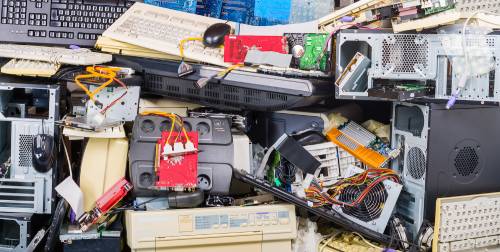
In the UK, there are many laws and regulations surrounding the recycling of technology. In this blog post, we will take a look at how technology is recycled in the UK and what types of devices are considered IT for recycling purposes.
IT Recycling Companies
The first step in recycling technology is to find a certified recycling company. These companies are regulated by the government and have to follow strict guidelines in order to be certified. Once you have found a company, you need to check whether they accept the type of device that you want to recycle. For example, some companies only recycle bulk items, while others will recycle everything from one mobile phone upwards.
Once you have found a company that fits in with your needs, you can check whether they offer free recycling or not. Some companies will charge a fee; however, many certified recycling companies offer free recycling and will sometimes offer profit sharing schemes if large amounts of items are to be recycled.
What Types of Technology Can be Recycled?
There are many types of technology that can be recycled. Some common examples include:
- computers
- laptops
- mobile phones
- tablets
- servers
- printers and scanners
- networking equipment
Recycling technology can help to reduce e-waste, which is a growing problem around the world. In addition, it can also help to conserve resources and save energy.
There are many recycling centres that will accept old electronics, but it’s important to find one that is responsible and specialises in recycling these types of items.
Frequently Asked Questions About IT Recycling
1. The benefits of recycling IT for businesses
The benefits of recycling IT for businesses are many and varied. By recycling your IT equipment, you can help to reduce the amount of e-waste that ends up in landfill sites. This, in turn, can help to protect the environment from harmful toxins and chemicals.
In addition, recycling your IT equipment can also save your business money. By selling or donating your old equipment, you may be able to recoup some of the costs associated with upgrading to new technology. Or by buying recycled or refurbished equipment, you can get high-quality products at a fraction of the price of new items.
So why not do your bit for the environment and your bottom line by recycling your IT equipment? It’s a win-win!
2. How to recycle IT for your business

So, how can you recycle your IT equipment for your business? One option is to sell it or donate it to a charity or non-profit organisation. This is great if you have old computers or laptop in working order, but they are too old to support your business activity.
Working with an IT recycler can help you identify local charities or NFP organisations to donate to. They will also ensure that all data is wiped prior to passing on with their secure data destruction service. This is vital to protect sensitive data.
You can also speak to an IT Recycling Company that will come and collect all of your old and unwanted technology and ensure that as much as possible is recycled, reused, or broken down into component parts. They will ensure all necessary paperwork is completed and all legislation adhered to.
This takes away unnecessary work, and it will unlikely cost you a penny!
3. What happens to recycled IT products?
When you recycle your IT equipment, it’s important to know that it will be disposed of in a safe and responsible manner. That’s why you should only use reputable recycling companies that are certified by the relevant authorities.
Reputable recycling companies will ensure that your old equipment is dismantled and recycled in accordance with all the relevant environmental regulations. This means that harmful toxins and chemicals will be safely disposed of, and that valuable materials will be reused where possible.
So, when you recycle your IT equipment, you can rest assured that it will be dealt with in a safe and responsible manner. And that’s good for the environment and for your conscience!
4. The environmental impact of recycling IT
When you recycle your IT equipment, you’re not just helping to reduce the amount of e-waste in landfill sites. You’re also helping to protect the environment from harmful toxins and chemicals.
You can greatly reduce the impact on the environment of your own business. This can also help to improve your brand reputation and could even help you gain new business if you have a strong environmental policy and company ethos.
5. How to reduce the amount of waste produced by your business
As well as recycling IT equipment, it’s also important to reduce the amount of waste created in the first place.
The amount of waste produced by businesses can be staggering, but there are ways to reduce the impact your business has on the environment. Here are six tips to help you decrease the amount of waste your business produces:
-Evaluate your packaging. Excess packaging is one of the main culprits when it comes to business waste. Take a close look at the packaging you use and see if there are ways to streamline it. Perhaps you can switch to using recycled materials or find a more efficient way to package your products.
-Encourage employees to recycle. Make sure recycling bins are easily accessible and encourage your employees to use them. You could even offer incentives for recycling, such as giving employees an extra day off if they recycle a certain amount of waste.
-Reduce paper usage. Many businesses rely heavily on paper, but there are ways to cut back on its use. See if you can switch to digital documents where possible and encourage employees to print double-sided. You can also look into using recycled paper products.
-Choose environmentally friendly products. When you’re stocking your office or place of business, opt for eco-friendly options whenever possible. This could mean anything from using recycled printer cartridges to choosing energy-efficient appliances.
-Donate unused items. Instead of throwing away unwanted office supplies or furniture, see if there’s a local charity or organisation that could make use of them. Donating items is a great way to reduce waste and help those in need.
-recycling old IT equipment. Many businesses upgrade their computers and other IT equipment on a regular basis, but what do you do with the old stuff? Recycling your old electronics is a great way to reduce waste and ensure that harmful materials don’t end up in landfills.
By following these tips, you can help reduce the amount of waste your business produces. Do your part to protect the environment and create a more sustainable workplace.
What UK Legislation Exists for Businesses Disposing of Electronic Equipment?

The Waste Electronic and Electrical Equipment Regulations (WEEE Regulations) are a UK Statutory Instrument that came into force in 2003. They set out regulations for the collection, treatment, and recycling of electronic equipment.
The WEEE Regulations require producers of electronic equipment to finance the collection, treatment, and recycling of waste electronic equipment.
The WEEE Regulations also place a responsibility on local authorities to provide facilities for the collection of waste electrical and electronic equipment.
Businesses that sell electrical and electronic equipment are required to take back waste equipment free of charge if the customer requests it.
If you are a business that disposes of electrical or electronic equipment, you must ensure that it is disposed of in accordance with the WEEE Regulations. Understand how we handle your IT waste in our Recycling Process.
Failure to comply with the WEEE Regulations can result in fines of up to £5000.
So, it’s always best to work with a fully insured and certified IT recycling company such as Recycling Your IT who are always up to date with current legislations, ensuring your business reduces its impact on the environment and adheres to any laws and legislation that may be relevant.
